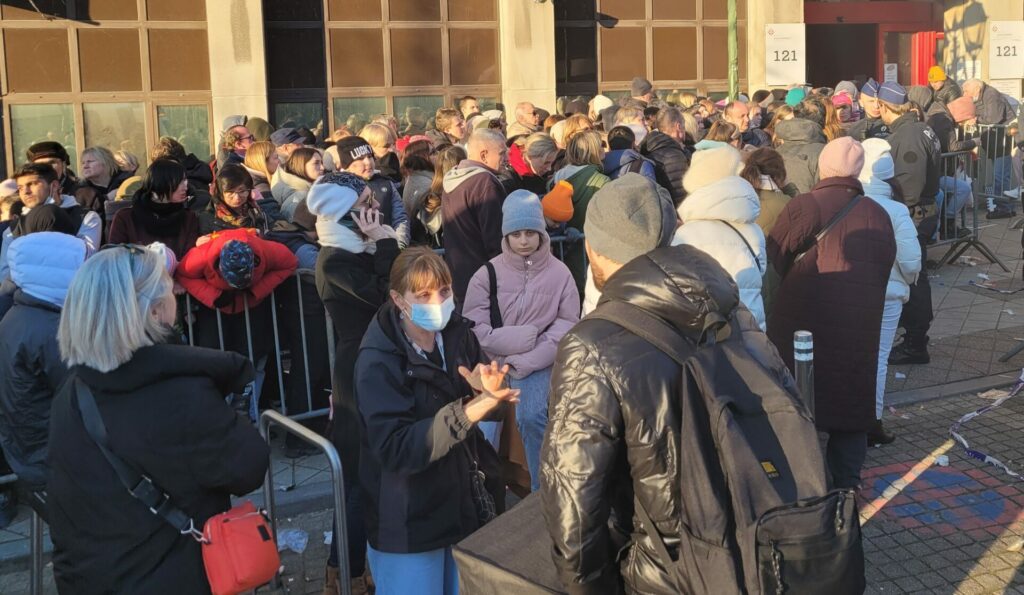The current reception structures in place in Belgium are buckling under the exponentially increasing number of Ukrainian refugees arriving in the country, further underscoring the need for a more coordinated approach.
The large crowds of people queueing at the registration centre created in the former Jules Bordet hospital in Brussels for the reception of refugees will continue to grow in the coming days, according to State Secretary for Asylum and Migration Sammy Mahdi, who said Belgium must start looking at receiving them with the help of "emergency villages".
"You look at the large number of people that are arriving here and it is increasing exponentially. I am getting worried and I think we will need large-scale reception centres in all the provinces that can accommodate people in the short term because otherwise, we are not going to get there," he told Radio 1.
He added that, based on the concerns he currently has, he will ask the government to call in crisis management at the federal level to help out Flanders and Wallonia. The idea is that the National Crisis Centre will coordinate all assistance, as was done during the floods in Wallonia and during the pandemic.
“Maak me ernstige zorgen. Crisishuisvesting voor Oekraïeners moet veel sneller. Vlaanderen en Wallonië moeten zorgen voor grote opvangcentra in alle provincies. Indien nodig, moet federale regering regie overnemen.” @radio1be #deochtend
— Sammy Mahdi (@SammyMahdi) March 9, 2022
Tweet translation: "Deeply worried. Crisis accommodation for Ukrainians must be much faster. Flanders and Wallonia must provide large reception centres in all provinces. If necessary, the federal government must take over."
Normally, housing is a regional competency, but Mahdi stressed this shouldn't be a concern now. "The last thing we need to do now is focusing on political quarrelling and arguing over who is competent for what."
"These people need to be taken care of now, and if I see that we are not moving fast enough, then we need to join forces. My first concern is not who is going to do what, it is the accommodation of the Ukrainians," he said.
On Monday, the federal government already announced that cities and municipalities can place temporary constructions such as housing units and tents for the emergency shelter of Ukrainian refugees without completing the permit procedure, meaning they can be put in place more rapidly.
Creation of large reception centre
The Temporary Protection Directive was activated by the EU last week, meaning people fleeing the war in Ukraine are given a residence permit and will gain access to education and to the labour market.
However, despite this historic move, hundreds of people are queueing up to register at the Brussels reception centre. "The day before yesterday some 700 people were in line here, yesterday it was 800, and those numbers are likely to increase."
"We are trying to explain to people in the queues that this is not needed, they have 90 days to come to this centre and register officially," Mahdi said, adding that he recommends people to go to the nearest municipality for an appendix 3 arrival declaration and that the registration in Brussels can be done much later.
Related News
- 'Affected first and worst': Ukrainian women and girls at increased risk of sexual violence
- Molenbeek reception centre welcomes Ukrainian refugees
In recent days, Mahdi has held discussions with the city of Brussels to create a larger centre with a bigger capacity to deal with the influx of refugees. He expects this to open next week, stressing that there is a real need for it now.
"We are in contact with the owners of a large plain in Heysel, and are trying to see with them what is possible to organise there," a spokesperson for Brussels mayor Philippe Close told The Brussels Times.
Individual vs. collective approach
Mahdi launched a call under the guise #PlekVrij (Free Space), asking people to voluntarily host refugees and calling on municipalities to make municipal buildings and sports halls available for those waiting for a permanent place of residence and to map these per city or town. So far, more than 15,000 places of shelter have been offered.
In light of the scale of the issue, the initiative was criticised by Antwerp's mayor Bart De Wever, who said that it is up to the authorities, not individuals, to shelter Ukrainian refugees. "Is it because the cities will take the blows again that Mahdi is shrugging off responsibility?" he wrote on Facebook.
Mahdi disagreed with De Wever, saying it helped activate cities and municipalities to ensure a form of collective crisis accommodation and guarantee shelter for people, but he acknowledged that the current approach will not suffice.
"I notice that there are a lot of municipalities that want to engage, but that is not the case everywhere, and above all, we need a lot more places, which is why a more structured approach is needed in all provinces."

